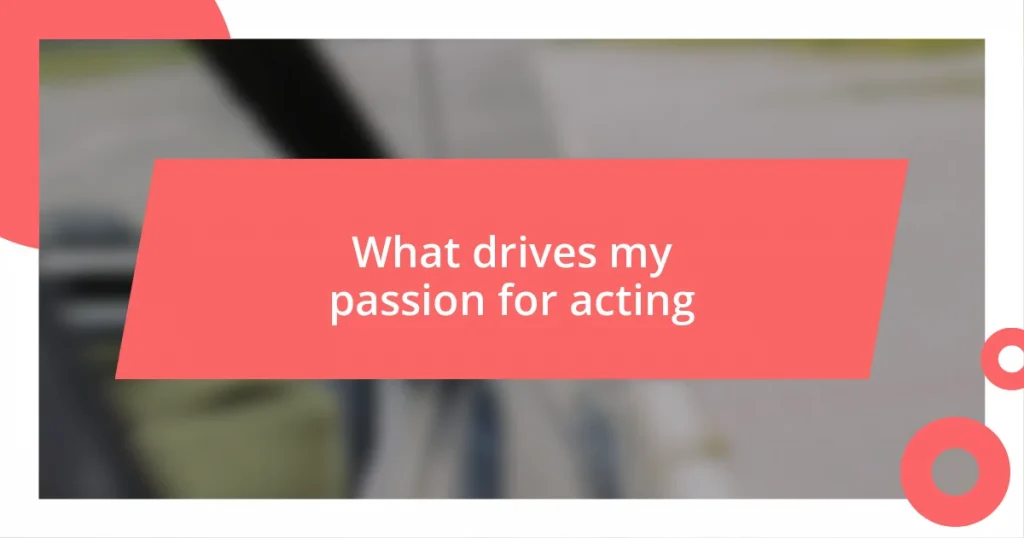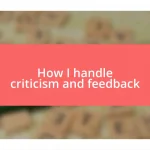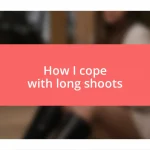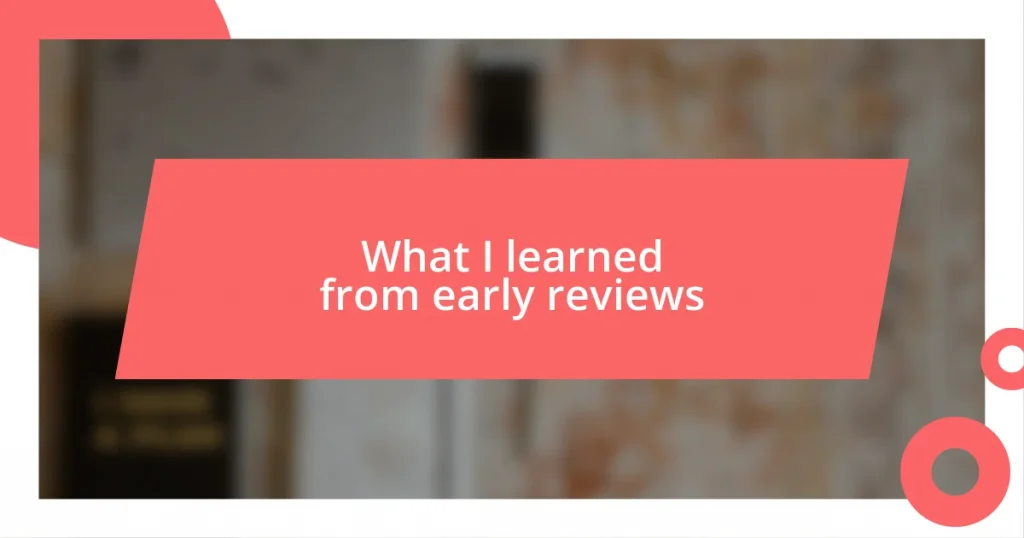Key takeaways:
- The emotional connection and vulnerability in acting foster personal growth and empathy, significantly enhancing the storytelling experience for both the actor and the audience.
- Influential mentors, family support, and diverse roles play a crucial role in shaping one’s passion for acting, offering insights and emotional depth that enrich performances.
- Engaging with audience feedback, setting personal goals, and taking breaks are essential strategies for sustaining long-term passion and creativity in the craft of acting.
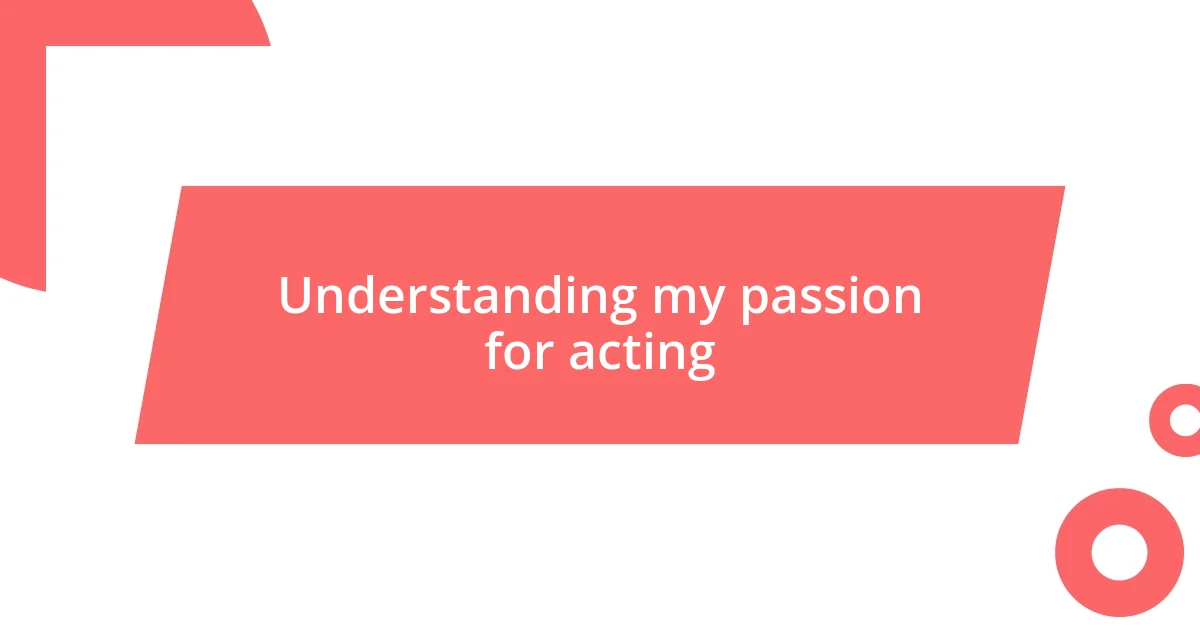
Understanding my passion for acting
Acting has always felt like a second skin to me—a realm where I can express my emotions honestly and fully. I remember the first time I stepped onto a stage; the lights were blinding, but I felt alive. The thrill of embodying someone else, even for a brief moment, makes me question: isn’t that the essence of understanding ourselves through the stories we tell?
The emotional connection I forge with the characters I play profoundly shapes my passion. Each role pulls me in, prompting me to explore the depths of joy, sorrow, and everything in between. I recall portraying a character who was grappling with loss. It was a challenging experience that left me reflecting long after the curtains fell. Can such moments of vulnerability redefine how we perceive our own struggles?
Moreover, I realize that my passion isn’t just about the performance itself but about the shared experience with the audience. Each reaction—laughter, tears, or silence—creates an electric bond that I cherish deeply. Have you ever felt that connection while watching a performance? For me, it’s a reminder of the power of storytelling, forging a path for empathy and understanding.
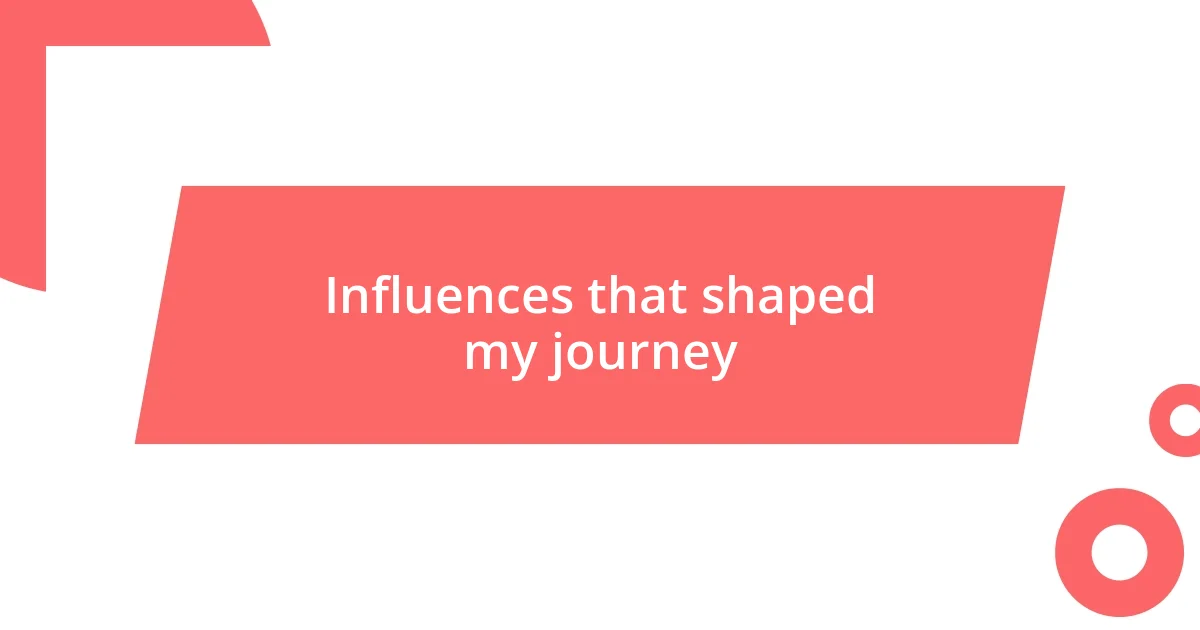
Influences that shaped my journey
The journey of my acting passion has been significantly influenced by a myriad of individuals and experiences throughout my life. I vividly remember my high school drama teacher, who not only encouraged me to pursue acting but also introduced me to classic plays. Her passion was infectious, and one day, as I performed a monologue, I could see her eyes shining with pride. It made me realize how powerful mentorship can be in shaping our dreams.
In addition to teachers, my family played a crucial role in kindling my love for acting. My grandmother was a theater enthusiast and often took me to local performances. I recall the night we attended a gripping drama; her reactions were so animated, it felt like a private showing just for us. Those moments brought layers of emotion into my world, affirming that storytelling is a universal language that transcends generations.
Lastly, the diverse roles I’ve had the chance to portray have deeply impacted my journey. Each character taught me something new about myself and the world. I once played a role that required me to understand and convey the feelings of someone from a vastly different background. Preparing for that performance involved weeks of research and empathy, but the transformation was exhilarating. I often think, how do these experiences shape not just our craft but also our perspectives on life?
| Influences | Impact on My Journey |
|---|---|
| High School Drama Teacher | Encouraged and cultivated my passion for acting |
| Family Support | Shared experiences that deepened my emotional understanding |
| Diverse Roles | Expanded my perspective and enhanced my craft |
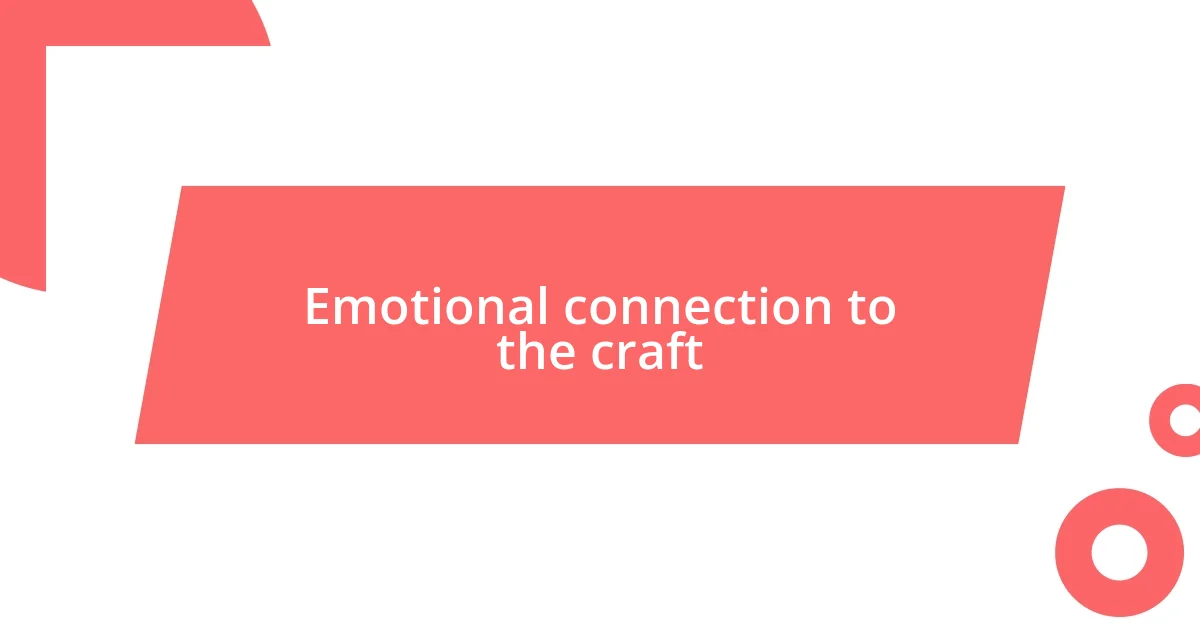
Emotional connection to the craft
The emotional connection I have with acting runs deep and is woven into the very fabric of my being. I still remember the first time I stood in front of an audience, portraying a character who bore their soul. It felt as though my own vulnerabilities were laid bare alongside theirs. Through that connection, I discovered how the rawness of emotion, whether it’s joy, heartbreak, or fear, allows us to engage with our own experiences. It’s like tapping into a universal heartbeat that resonates with every soul present.
- Every role is an emotional journey, challenging me to confront parts of myself I may not usually acknowledge.
- The applause or silence at the end of a performance reinforces that shared human experience, creating a bond that’s hard to describe.
- Those moments of connection empower me to seek truth in each character, as I believe that authenticity in emotion transforms not just performances but also audiences.
When I delve into a character, it often feels like peering into a mirror reflecting my own emotions. I recall one performance where I embodied a character facing tremendous betrayal. As I explored that pain, I found myself reminiscing about my own past experiences—how they shaped my understanding of trust and love. It’s a unique feeling; through acting, I can explore my feelings safely while also touching the hearts of others. This deep emotional thread that ties us all together is exactly what fuels my passion.
- Engaging with intense emotions allows for personal healing and reflection.
- Sharing these moments with fellow actors and the audience makes every performance a collective experience.
- I sometimes find that the emotions portrayed linger long after the stage lights dim, prompting conversations about life, love, and our shared stories.
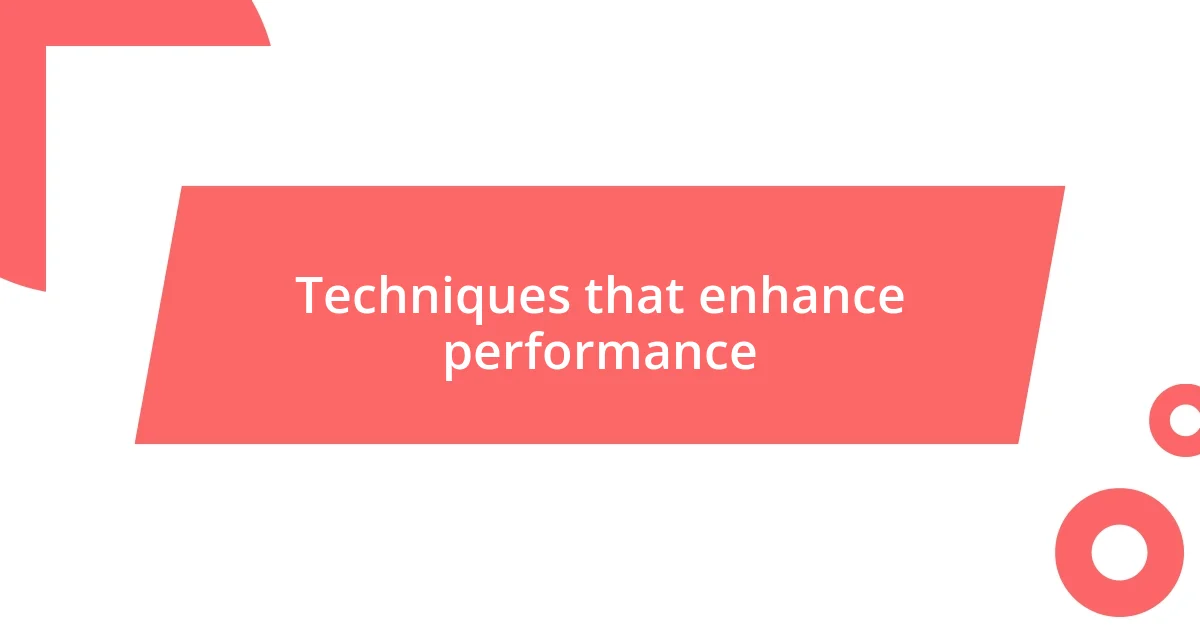
Techniques that enhance performance
One technique that has profoundly enhanced my performance is the practice of visualization. Before stepping onto the stage, I often take a quiet moment to envision the scene, imagining every detail—the set, the audience, and most importantly, my character’s emotional state. This mental rehearsal not only calms my nerves but also allows me to fully immerse myself in the moment. Have you ever experienced the thrill of anticipation before a big event? That rush can be amplified when you visualize success, and I know from personal experience how it sets a positive tone for my performance.
Another vital technique I rely on is character immersion. When preparing for a role, I dive into research beyond the script. I read novels, watch films, and sometimes even engage with people who share traits with my character. Once, while portraying a journalist, I interviewed actual reporters to understand their challenges and motivations. This not only sharpened my portrayal but also deepened my empathy for the character’s struggles. Have you noticed how much richer a story feels when it’s rooted in authentic experiences? That’s the beauty of immersing oneself in the essence of a role.
Lastly, I embrace the power of feedback. I regularly seek out constructive critiques from my fellow actors and directors. This openness has taught me invaluable lessons about my craft. After a performance of a dramatic piece, a colleague pointed out a specific moment where I could amplify my emotional response. The next night, I tried it, and the audience’s reaction was palpable. Isn’t it fascinating how collaboration can elevate our abilities? Those moments of growth not only enhance my performance but also create an environment of mutual support, making the journey exhilarating.
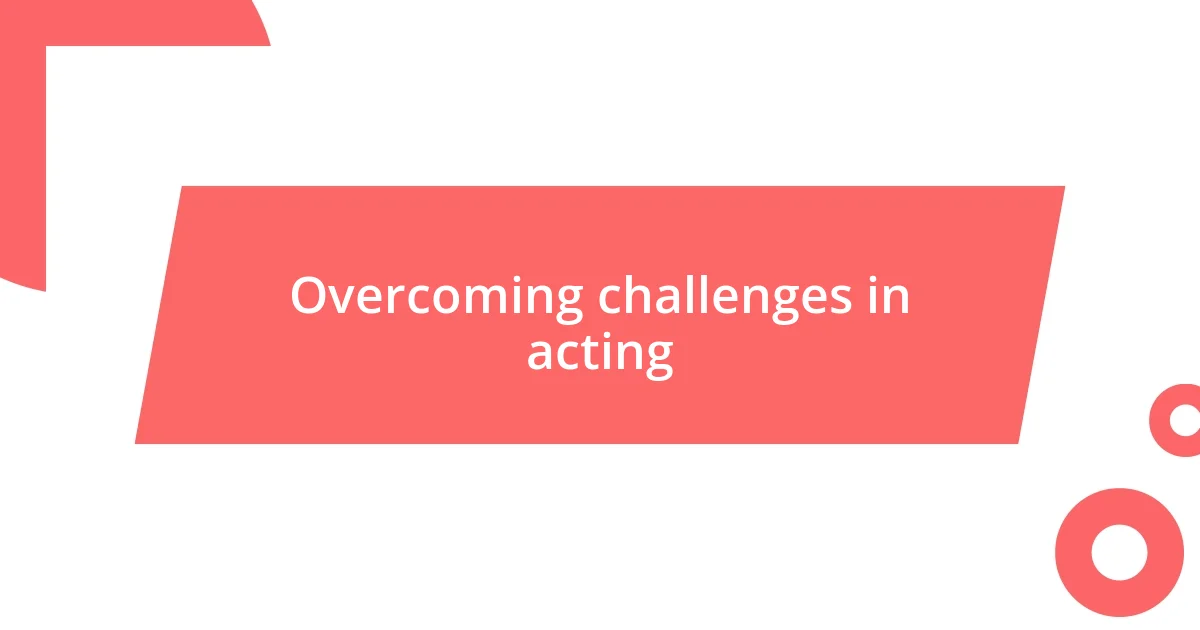
Overcoming challenges in acting
Acting comes with its fair share of challenges, but I’ve learned that embracing them is part of the journey. One of the toughest hurdles I faced was overcoming self-doubt before going on stage. I remember a particular performance where I stumbled during rehearsal, and the thought that haunted me was, “What if I fail in front of the audience?” Instead of succumbing to that fear, I found strength in preparing deeper and trusting my instincts. It’s that moment of self-acceptance that transformed my anxiety into a form of energy that fueled my performance.
As I’ve grown, I’ve realized that feedback can often be a double-edged sword. I vividly recall an instance where I received criticism that struck me to my core. At first, I felt defensive—after all, I had poured my heart into the role. But upon reflection, I understood that my fellow actors were offering insights not to hurt me, but to help me grow. That day, I learned to view challenges not as roadblocks, but as stepping stones that pave the way toward a more nuanced performance. It begs the question: How can we grow if we don’t confront the areas where we need improvement?
Moreover, the demands of embodying different characters can be taxing, both physically and emotionally. I once took on the role of a grieving parent, and the emotional toll seeped into my daily life. I found myself unexpectedly tearing up over small things—a reminder of how acting mirrors our reality. I learned to manage this emotional fallout by establishing boundaries, ensuring a safety net for myself during intense performances. Isn’t it interesting how our craft can teach us not only about characters but also about our own resilience? In navigating these obstacles, I’ve discovered a deeper sense of purpose, fueling my passion for the art of acting.
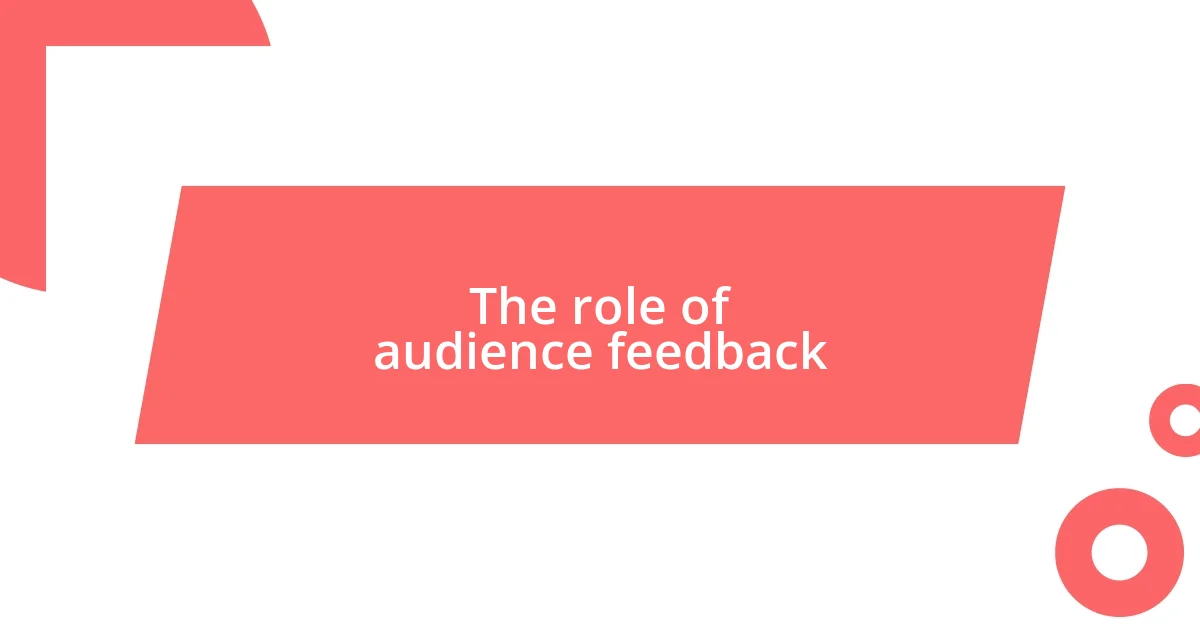
The role of audience feedback
Audience feedback plays a crucial role in shaping my performances as an actor. I vividly recall a particular show where the audience’s laughter at an unexpected moment made me realize how alive the connection can be. It’s as if their reactions energize the entire room, creating a symbiotic relationship where both performer and audience are participants in the unfolding story. Have you ever felt that electric moment when the energy shifts? It’s pure magic.
After every performance, I often seek out specific feedback from those who watched. One time, a viewer shared how a subtle gesture I made resonated with them, drawing them into the character’s struggle. Hearing that made me reflect deeply on the importance of those small moments. I started to realize that it’s these nuances that can elevate a performance and truly engage the audience. Isn’t it fascinating how one tiny detail can echo so profoundly in someone else’s experience?
Conversely, not all feedback is easy to digest. Once, a dear friend pointed out that my portrayal was too understated, suggesting that I needed to find a bolder way to express my emotions. At first, I felt a pang of disappointment—did I really miss the mark? Yet, after taking a step back, I understood that this insight was a stepping stone to enhancing my craft. Isn’t it interesting how vulnerability can lead to growth in performance? As actors, this ebb and flow of audience interaction not only challenges us but ultimately deepens our passion for acting.
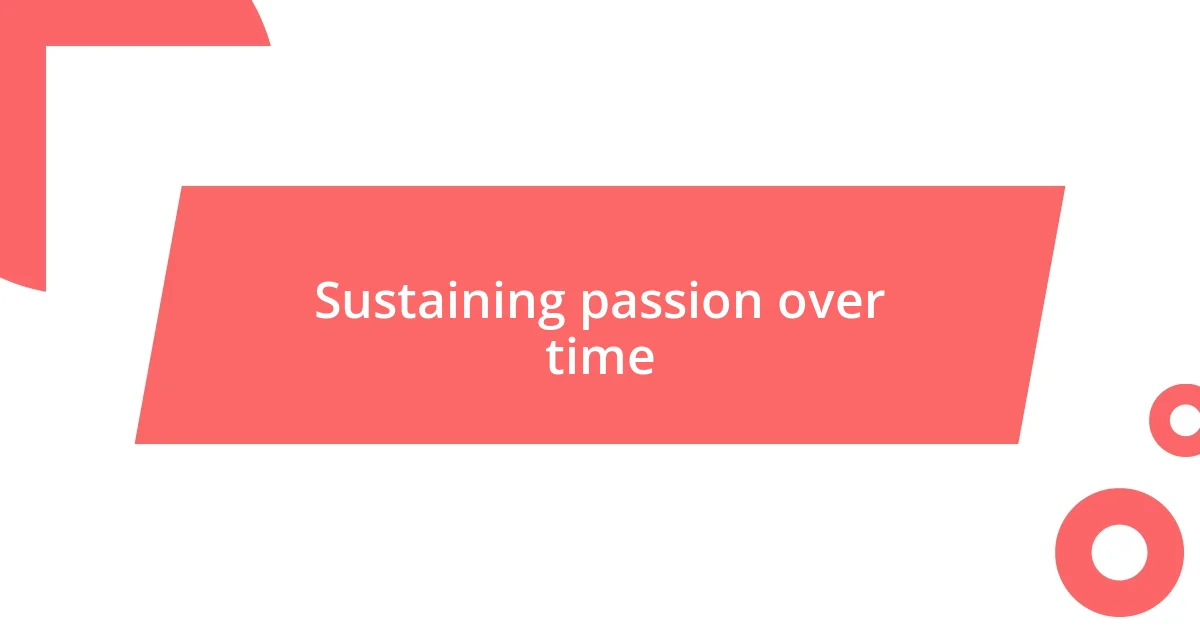
Sustaining passion over time
Sustaining passion over time is a multifaceted journey. I’ve found that setting personal goals helps me stay engaged in the craft. For instance, while preparing for a recent role, I decided to not just memorize lines, but also to dive into the character’s backstory. This approach transformed routine rehearsals into a thrilling exploration that reignited my enthusiasm. Could that be the secret to maintaining passion—the pursuit of deeper understanding?
Another factor that keeps my passion alive is the sense of community within the acting world. I cherish the moments spent with fellow actors during long rehearsals. Those late-night discussions about our characters’ motivations often spark joy and creativity within me. It’s like we’re all on this journey together, uplifting one another. Isn’t it remarkable how shared experiences can create connections that enhance our love for the art?
Finally, I’ve learned that taking breaks is crucial for sustaining long-term passion. After an intense show, I often step back and recharge, allowing myself to experience life outside of acting. I remember one season when I felt burnt out and hesitant to return to the stage. A brief hiatus helped me regain perspective, spark fresh ideas, and return with renewed energy. Have you ever noticed how distance can offer clarity? In embracing this cyclical nature of passion, I’ve come to understand that it’s the ebb and flow that ultimately fuels my creativity and commitment to acting.










